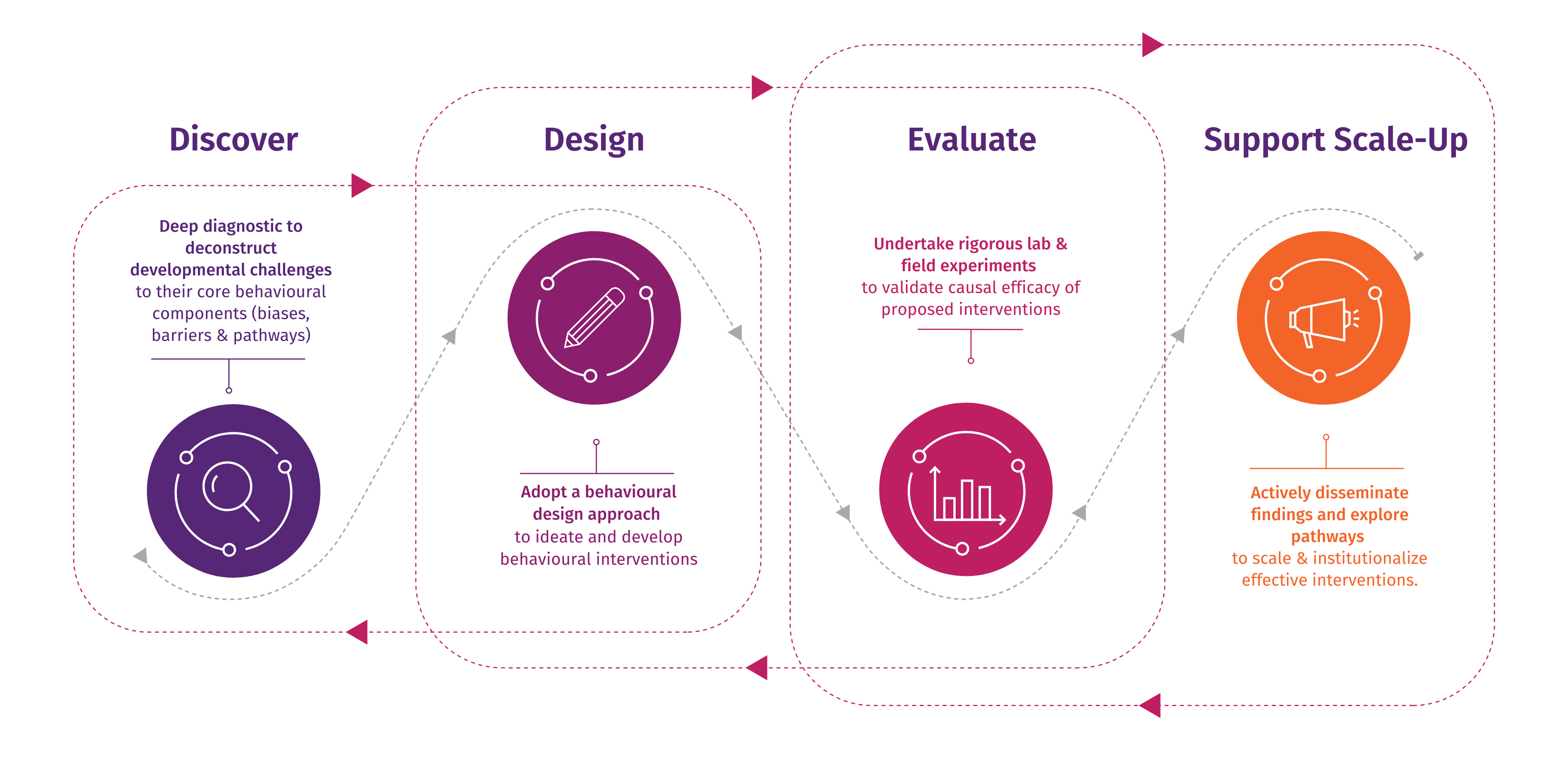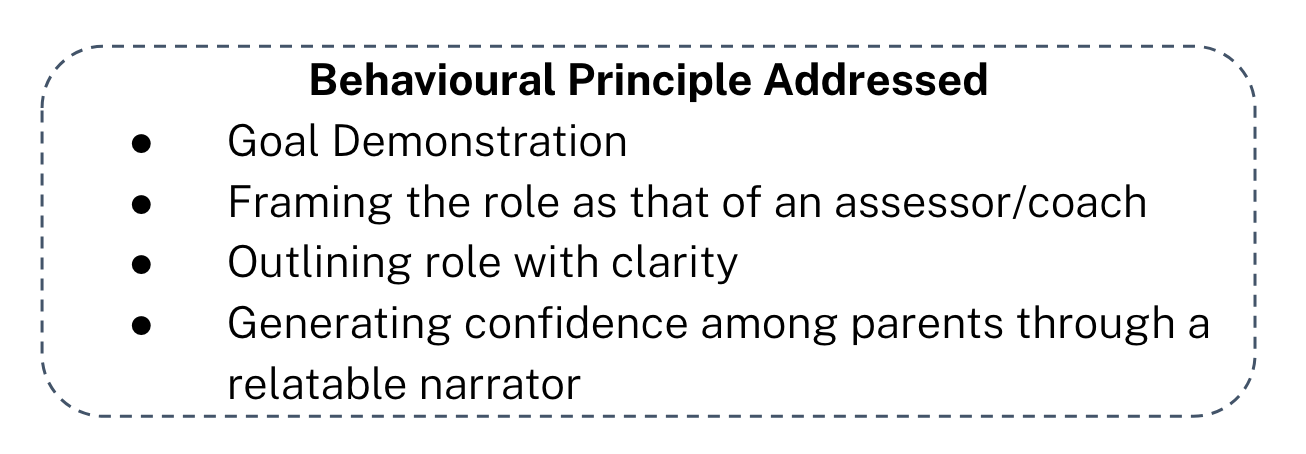- Year 2022
- Theme Education
- Team Research
Partnerships
- Central Square Foundation


Key documents
CSBC, in partnership with Central Square Foundation, identified behavioural barriers to effective parental engagement in the Foundational Literacy and Numeracy (FLN) learning of their children and designed intervention packages based on behavioural principles aimed at increasing it. The team evaluated the effect of the intervention on improving parental engagement with FLN through a randomised controlled trial (RCT). The RCT was conducted in the aspirational districts of Chitrakoot and Bahraich, UP, with parents of students studying in grades 1-3 in government schools.
Foundational literacy and numeracy (FLN) refer to the basic literacy, numeracy and transferable skills that form the building blocks for a life of learning (Herbert, Saavedra et al., 2021). Foundational learning levels are poor in India, and have declined in recent years, according to a state-wide assessment conducted in Karnataka by ASER in March 2021, the National Assessment Survey conducted in November 2021 by the Ministry of Education and a multi-state study conducted by Azim Premji University.
CSBC partnered with CSF to identify how to minimise behavioural biases, leverage social norms, and encourage the uptake of best practices to support the achievement of FLN student outcomes at scale. The project included the following stages:

Discover Phase: In the Discover phase, we identified three critical stakeholders - parents, teachers and teacher coaches/mentors - in the FLN program of Uttar Pradesh and conducted a diagnostic exercise with them to identify behavioural barriers among these stakeholders that hindered the acquisition of FLN skills by the students. The figure below summarises the barriers identified by the parents:


Design Phase: We conducted design workshops and meetings with various stakeholders to identify solution principles to increase FLN education engagement. Based on the discussions, we shortlisted, refined and developed the specific interventions. For the first phase of the project, we focused on parental engagement in FLN.
CSBC and CSF developed an intervention using the following principle

Providing clarity of role to the parents: the intervention reframed the role of parents as coaches in their child’s journey to acquire FLN skills. While parents, especially those of first-time learners, might not have the knowledge or resources to be good teachers, they can be good coaches. Being a good coach involves engaging with the child’s education, assessing their child’s performance and tracking progress, motivating them to learn, and arranging support for them when needed. Parents were reassured that they could help facilitate their child’s learning through this role regardless of their own education levels.
This overarching principle was combined with other behavioural components, such as:
The resultant intervention was an 8-week program for the parents which included an onboarding session with relatable videos, 40 simple DIY-type activities (activities for parents were adapted from Rocket Learning) with instructions to be done over 8 weeks, trackers to monitor progress and tools to help build consistency. The intervention was designed for both online (through WhatsApp) and offline (through workbook) delivery modes. The figure below details the intervention components:





We conducted a field randomised controlled trial to test the effectiveness of the intervention in improving parental engagement with FLN in the aspirational districts of Chitrakoot and Bahraich in Uttar Pradesh with 1017 parents during March-May 2022.
The primary outcome of interest was the impact of the interventions on parental engagement in FLN. Parent engagement in FLN was measured through variables such as willingness to pay for FLN, narrative vignettes and confidence bias. Our analysis of the evaluation data revealed that both the workbook and WhatsApp intervention had a positive impact on parent engagement outcomes.
Our primary outcome was the parental engagement with their children on FLN, which we measured in several different ways. As a self-reported measure of time spent on FLN-related activities is likely to suffer from social desirability bias, we designed two other measures for parental engagement - FLN price and vignette scores. We asked the participants about their willingness to pay for 30 minutes of instruction on FLN activities they can do with their children. The choice was implemented for a randomly selected subset of participants, thus incentivising parents to reveal their true preferences. For this measure, we see an increase in the willingness to pay by Rs. 13.69 for the participants in the workbook treatment.
| WhatsApp Group | Regression Specification |
Coefficient | Treatment mean Control mean |
|
|---|---|---|---|---|
| FLN Price | OLS | 2.606 | Rs. 191.80 (Rs. 186.50) |
|
| Primary Outcomes |
Vignette Score- Accuracy |
Logit | 116 | 30.55% (27.2%) |
| Vignette Confidence Bias |
OLS | -0.047 | 0.50 0.55 |
|
| Self-reported Time Spent |
Ordinal Logit | 1.586 | 3-5 hours/week (3-5 hours/week) |
| Workbook Group | Regression Specification |
Coefficient | Treatment means (Control mean) |
|
|---|---|---|---|---|
| FLN Price | OLS | 13.69 | Rs. 192.61 (Rs. 180.69) |
|
| Primary Outcomes |
Vignette Score- Accuracy |
Logit | 1.065 | 28.29% (29.97%) |
| Vignette Confidence Bias |
OLS | -0.005 | 0.51 0.52 |
|
| Self-reported Time Spent |
Ordinal Logit | 1.119 | 3-5 hours/week (3-5 hours/week) |
We also designed a set of 10 vignette-style questions which described the child’s FLN skills in the context of day-to-day life and asked the respondents for the ideal next steps by the parents. The mean vignette score was 30.55% for parents in the WhatsApp intervention group and 27.20% for parents in the control group. Being in the WhatsApp group increased the odds of narrative vignette accuracy by 1.16 times, significant at a 10% level.
We also used the vignette questions to measure the effect of the intervention on parents’ confidence regarding their role in FLN instruction. An outcome variable was constructed to measure parents' confidence vis-a-vis the accuracy of their answers. The confidence bias measure is thus the difference between average confidence over the vignette questions minus average accuracy, and we see that the WhatsApp group significantly decreases the confidence bias. Note that this effect could be driven by the increasing accuracy of the vignette questions.
Several secondary outcomes assessing the FLN knowledge of parents, the importance they place on education, FLN, and different factors contributing to FLN engagement were also collected during the surveys. However, we observed no significant results for either workbook or WhatsApp interventions, with one exception, as seen in the table.
From the above results, we conclude that both interventions successfully increased parental engagement in FLN through the value that parents placed on FLN engagement (for the workbook group) and willingness to choose higher FLN engagement activities (for the WhatsApp group).
Research funders and other information: The project was conducted in partnership with the Central Square Foundation .